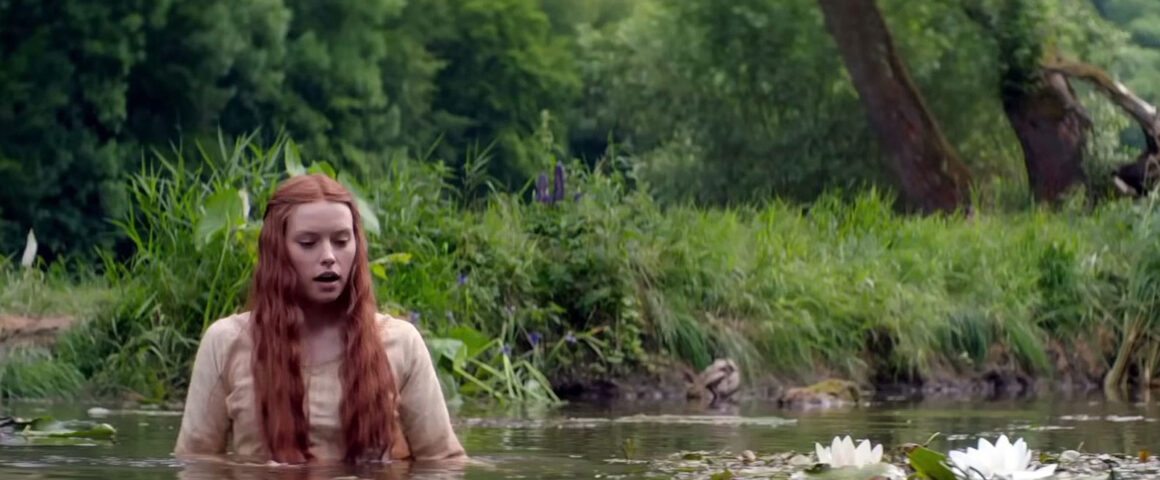Claire McCarthy’s Ophelia opens with the titular character telling, via voice-over, that she feels it is time that we hear her narrative told from her perspective. This is a promising notion. Many of Shakespeare’s supporting women warrant narratives on their own, and the veracious success that was 2016’s “Lady Macbeth” proves just how potent they can be when the director is willing to take risks — that film is not a direct Lady Macbeth story but rather spiritual retelling. After all, these are women who are consistently relegated to the sidelines of stories owned by men. Ophelia is a character ripe for reinterpretation and retelling. If Lady Macbeth is the prototypical ‘un-feminine’ heroine then Ophelia is her opposite; a character so steeped in conventions and assumptions surrounding women that her fall is caused by them. Her narrative in “Hamlet” is an inversion of tropes that were not even fully formed at the time. This is a story in which society’s fear that female sexuality will corrupt Ophelia is the real corruptive force in Ophelia’s life and turns her into the person they fear she might become.
There is an interesting story to be told of Ophelia reclaiming the inherent power of her femininity. Unfortunately, it is not this story.
Despite the early posturing that it will be a complete retelling, it becomes readily apparent that Ophelia is too closely married to its source material. That is not an inherently bad thing, “Hamlet” is regarded as Shakespeare’s best play for a reason. However, the best Shakespeare film retellings take the original text and remix it in a way that modernizes the story and themes. 2010’s “The Tempest” does this by swapping the gender of Prospero, and reframing their relationship to their daughter Miranda. “She’s The Man” (a retelling of “The Twelfth Night”) meanwhile shifts away from its themes of deceit and trust, to instead be a story about how the male/female gender dynamic is more powerful when utilized in a fluid, rather than rigid, manner. Even “The Lion King,” surprisingly one of the more faithful Shakespeare adaptations, still dramatically alters the central conflict by proposing that loss can be a tool for growth rather than totally destructive.
It is perhaps unfair to compare Ophelia to “The Lion King,” if for no other reason than that “The Lion King” occupies a near-sacred place in our cultural psyche. However, this is a film where the core concept begs comparison to the original, and in comparison, it pales to both the original play and the derivates it has spawned. The films greatest asset, it’s core concept, also proves to be the largest hurdle it must overcome. After all, Opehlia is only ever a supporting player in “Hamlet.” She functions more as a thematic tool than a plot one, her own descent into madness mirroring Hamlet’s and illustrating the toll of his actions. McCarthy (“The Waiting City”), along with writers Semi Chellas and Lisa Klein, introduce new sub-plots where Ophelia has more autonomy, but these never link back to the main story in a meaningful way.
Daisy Ridley (“Star Wars: The Force Awakens”) flounders as the titular character. Her performance is not deserted of merit, far from it, she is one of the few layered elements in the film. Rather she is a testament to how lost the entire film is. Ridley does her best to find an emotional through-line, something for the audience to gravitate toward, but never quite latches one it. As an actress, Ridley is best deployed opposite a strong co-lead, like Adam Driver in “Star Wars: The Last Jedi,” or in an ensemble, like “Murder on the Orient Express.” Ophelia has neither of these things. Ridley is decidedly the only lead, and the supporting cast all seem to have been given one piece of direction by McCarthy, leaving all the characters feeling flat and more two-dimensional than should be possible for “Hamlet.”
The entire film is littered with shortcomings. From dialogue that mimics the source material’s energy, but never captures it fully to plot-devices that feel out of place to costume design that looks cheap (Daisy Ridley’s wig should be burned). Most-telling of all, however, is that the only time the film feels truly alive is when it is bringing to life scenes from the stage play verbatim.
There is one scene that best encapsulates the film’s flaws — it’s Hamlet’s “play within a play.” The performances, direction, soundtrack, and design all come together for a shining moment. The mood is perfect, with the entire scene bathed in ominous red and jagged feeling yellows. It is by far the best scene of Ophelia. It is also a scene that, much like the film on a whole, has nothing to do with Ophelia.



